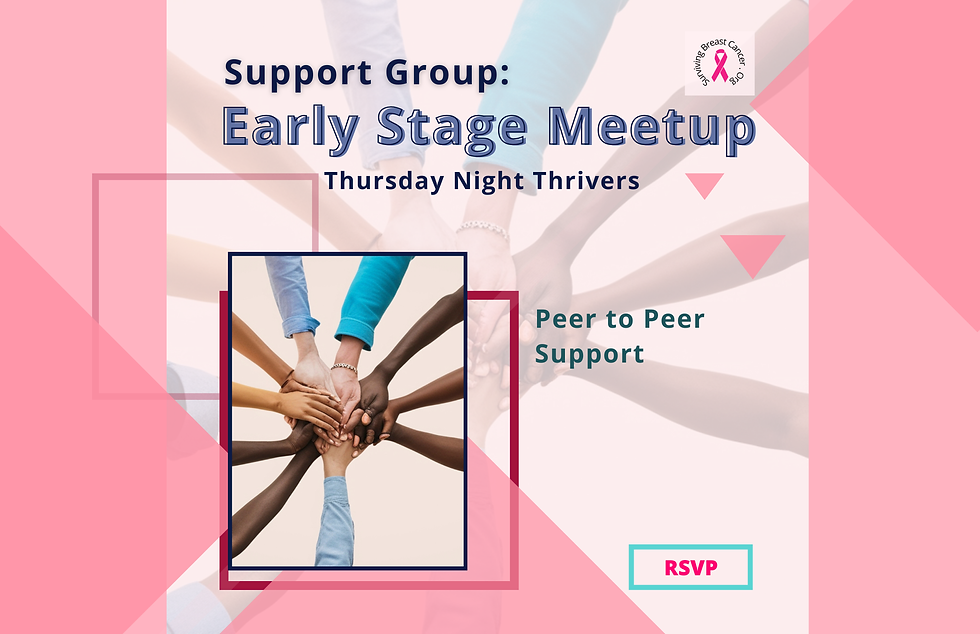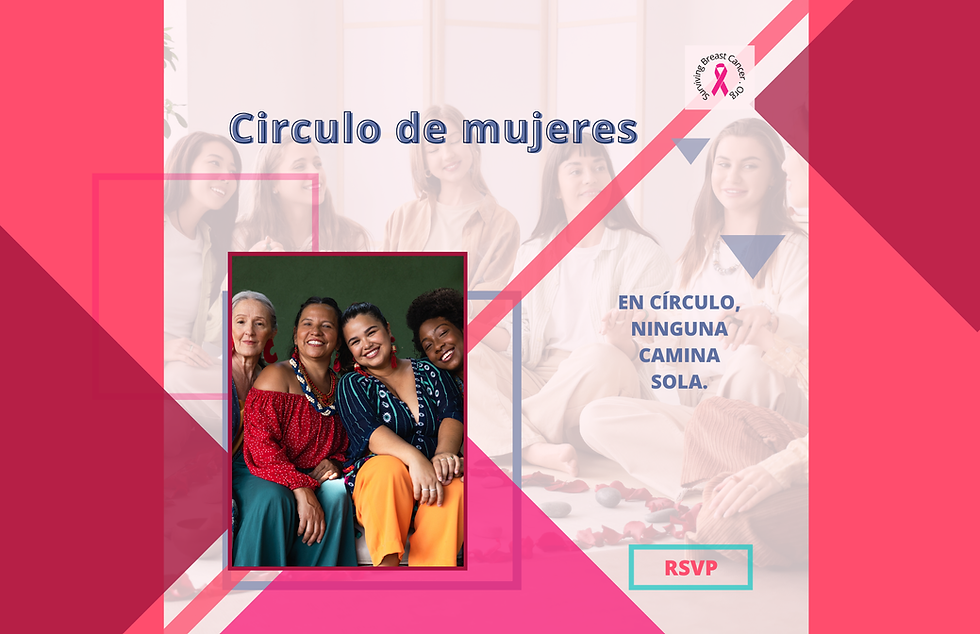Are You a Patient Advocate?
- Surviving Breast Cancer

- Aug 7, 2022
- 4 min read
Updated: Nov 4, 2025
Some people use their vacation days to go to the beach or the mountains. Others go on adventures and explore new countries. I used my vacation days this past week to attend the esteemed San Antonio Breast Cancer Symposium (SABCS).
Why? Because I was diagnosed with stage II ER+/HER2+ breast cancer and want to immerse myself in as much information as possible in order to understand my diagnosis, prognosis, and the latest news and information out there.

First Impressions at SABCS2019
The convention center had the SABCS logos and colors plastered onto every door; the main entrance had what looked like a welcome rug as big as you could imagine, adhered to the floor, greeting you as you walked into the lobby. Registration signs and tables were equipped with name tags and schedules, and the exhibitors were setting up in the main hall. I was excited.
The scope of the symposium is scientific. Thousands of oncologists, scientists, and researchers from all over the world swarmed to San Antonio, TX, to present their scholarly and academic work. I knew that there were going to be words, terms, acronyms, and graphs that I wouldn’t be able to understand. But that didn’t matter. I jotted down notes, scribbled down long, hard-to-pronounce names of pharmaceutical drugs, and short-hand reminders to myself to follow up on once I returned to the hotel room that evening. I was eager to learn as much as I could and feel empowered as I prepare for a follow-up oncology appointment at my cancer center the following week.
Themes from the Symposium
The opening session set the tone for the following 4 days. Topics focused on:
Metastatic breast cancer
HER (positive and negative) breast cancer
Hormonal receptor-positive subtypes.
Breast cancer that had metastasized to the brain.
Why are some people resistant to certain therapies
(To name a few).
Was I Becoming a Patient Advocate?
It’s natural to want to learn as much as you can about your own diagnosis, the specific drugs that you are on, and your particular gene line mutations. After all, it is what we know the most about from our own first-hand experience. But as I was sitting in the audience listening to the names of new drugs and the various cancer subtypes, I would lean over to my friends and whisper, “Oh, that’s the drug our friend Sarah is on!” or “That’s what happened to our other friend Claire.” There was a name, a face, and a person associated with every slide, with every study, with every new discovery. It became tangible. It was no longer a solo cancer adventure, but a collective one within the breast cancer population.
Transitioning from Patient Advocate to a Psycho/Social Economic Activist?
In a day and age where diversity and inclusion are embedded in every company’s business plan and HR strategy, it is no surprise that diversity conversations are also hot topics within the breast cancer and clinical trial communities. In the Patient Advocate Lounge, we would sit around tables discussing the role culture and ethnicity play in our healthcare system. While there are more questions than answers, at least we have begun to bring these important topics to the forefront of the discussion, and those who are diagnosed with breast cancer are using their voice to advocate for inclusion and push the envelope within clinical trials.
For example, less than ~5% of breast cancer diagnoses are Invasive Lobular Breast Cancer (ILBC). In fact, the statistic is so low that it is considered a rare disease and therefore excluded from clinical trials. In San Antonio, I met 3 women with ILBC, and what is the response when they ask, “What About Us?”
Triple Negative Breast Cancer makes up ~15% of breast cancer diagnoses, and while there are studies involving this subtype, there has yet to be an inhibitor that blocks the disease from developing after initial chemotherapy, surgery, and/or radiation are complete. Early-stage, triple-negative breast cancer is an aggressive form, but if one can get to the 2-year, 3-year, and 5-year mark without progression, the risk of recurrence drops significantly!

It is great that women are participating in breast cancer clinical trials, but it is imperative that the participants of the trial represent a diverse group. Otherwise, we would be doing ourselves a grave disservice in our understanding of how these new drugs perform for African American, Hispanic, and Asian (etc.) women if the majority of participants are white/ Caucasian women. I was glad to see that within the General Sessions, researchers were highlighting the diversity and ethnicity of participants within their trials. Our role as patient advocates is to continue to inform women that their participation is critical and encourage them to seek out clinical trials and to get involved.
A few great resources include:
Count Me In: https://www.broadinstitute.org/count-me-in
All for Us: https://www.joinallofus.org/en
Clinical Trials through the NIH: https://www.clinicaltrials.gov/
Among the patient advocates present in San Antonio, there was a great sense of camaraderie, and that those of us who are privileged are able to leverage that status in order to raise the tide so we all can float up!

Brushing Up on Your Advocacy Skills
Part of advocacy is learning. Being able to speak the language and understand the “rules” so you can enable change. I thoroughly enjoyed learning about the science of breast cancer, but after 4 days of intense research presentations and discussion, I am also self-aware, know my limitations, and recognize the areas I need to develop. For example:
What is the process for changing regulations when it comes to being able to participate in clinical trials?
In the advent of medical marijuana, why are we not allowed to travel with it on airplanes, but in light of an opioid crisis, TSA has no problem with us bringing oxy across state lines to help manage our pain?
How can advocates be part of the discussion when it comes to national and global guidelines on breast cancer best practices and determining the gold standard?
The list can go on, and there are resources out there to help you hone in on your advocacy skills and make a difference not only in your lifetime, but for all of those that follow behind us until we find a cure for breast cancer.
Patient Advocate Resources and Trainings to Consider:
Project Lead: http://www.breastcancerdeadline2020.org/get-involved/training/project-lead/project-lead-institute.html
Komen Advocacy Programs: https://p2a.co/cgXisY6
The Research Advocacy Network: https://researchadvocacy.org/advocate-institute
RISE Advocate through the YSC: https://www.youngsurvival.org/get-involved/be-an-advocate/be-a-ysc-advocate#become-a-rise-advocate










